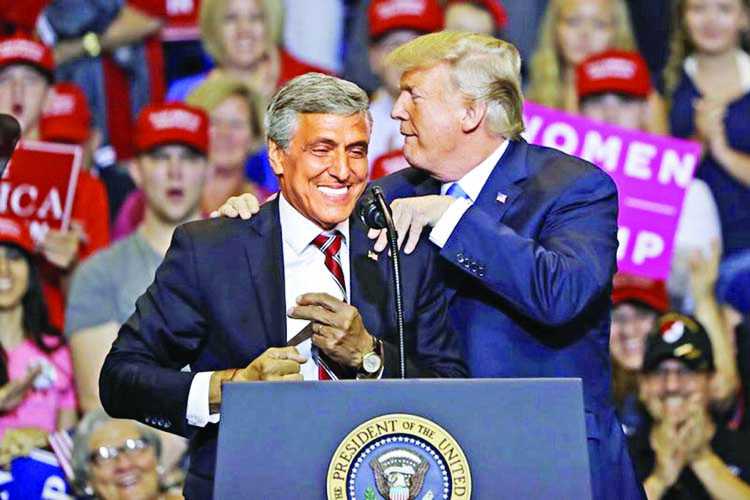Donald Trump reshapes midterm campaigns
05 August, 2018

President Donald Trump's strategy of becoming aggressively involved in the midterm elections is prompting concern among some Republicans who worry he's complicating the political calculus for GOP candidates trying to outrun his popularity.
Those Republicans worry their statewide candidates may rise or fall based on Trump's standing, muddling their path to maintain control of Congress.
But Trump has no plans to step out of the spotlight. He will hold a rally Saturday in Ohio and plans to host two fundraisers at the Trump National Golf Course in Bedminster, New Jersey, next week for House and Senate candidates, according to a campaign official with knowledge of the president's events. The official spoke on the condition of anonymity to discuss details about the fundraisers that haven't yet been publicly released.
The president is casting himself as the star of the midterms, eagerly inserting himself into hotly contested primaries, headlining rallies in pivotal swing states and increasing his fundraising efforts for Republicans. Last week, Trump agreed to donate a portion of his reelection fund to 100 GOP candidates running in competitive House and Senate races.
He's expected to be even more aggressive in the fall. White House officials say he's reserving time on his schedule for midterm travel and fundraising likely to surpass that of former presidents George W. Bush and Barack Obama."This is now about Donald Trump," said Al Cardenas, a former Florida Republican chairman. "It's a high-risk, high-stakes proposition."
The question facing Republicans is whether turning out those Trump loyalists is enough to win in toss-up congressional districts or if their path to victory depends more on capturing a share of independents and suburban women turned off by Trump's tumultuous first term. It's a dilemma they will confront in 2018 and beyond.
"If we lose the governor's race for the first time in 20 years, all of a sudden President Trump's chances of winning in 2020 diminish with a Democratic governor," said Cardenas. "You can't win a presidential election if you're a Republican without winning Florida."
Trump aides argue no one energizes Republicans like the president, pointing to the throngs of thousands who wait in long lines to attend his rallies - he's held 17 since taking office.
The aides say the White House is taking a two-pronged approach, sending Trump to mobilize the base while other officials, such as his daughter Ivanka, can generate local headlines and help with voters who may not like the president's aggressive style. The goal is to ensure that the occasional voters who turned out for Trump in 2016 cast ballots in the midterms.
But there are some signs that Trump's unpopularity with the general electorate may hamper more than help individual Republican candidates. While Republicans have won a series of special elections since Trump took office, they've captured smaller margins than in previous years.
Democrats also had two high-profile upsets, nabbing victories in an Alabama Senate race and a Pennsylvania House race. The GOP is worried about a special congressional election Tuesday in a central Ohio district that Trump won by 11 percentage points in 2016.
A Monmouth University poll released this past week showed the race tightening, leaving Republican Troy Balderson with just a 1-point edge. The survey found 46 percent of likely voters approved of Trump, while 49 percent disapproved.
TAG(s):
